
James Olson was an American actor.

A Stranger Came Home is a 1954 British film noir directed by Terence Fisher and starring Paulette Goddard, William Sylvester and Patrick Holt. The film was produced by Hammer Films at Bray Studios with sets designed by the art director J. Elder Wills. It is based on the 1946 novel Stranger at Home, which was credited to film actor George Sanders but was actually ghostwritten by Leigh Brackett. It was released in the United States by Lippert Pictures under the title The Unholy Four.

Edmund Jeremy James Walker, known professionally as Jeremy Kemp, was an English actor. He was known for his significant roles in the miniseries The Winds of War and War and Remembrance, the film The Blue Max, and the TV series Z-Cars.
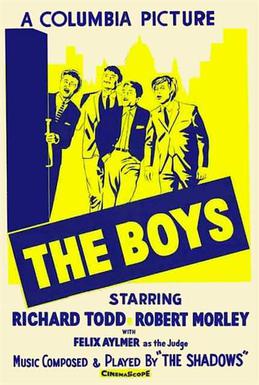
The Boys is a 1962 British courtroom drama film, directed by Sidney J. Furie and starring Richard Todd, Robert Morley and Felix Aylmer.The screenplay was by Stuart Douglass.

The Case of the Frightened Lady is a 1940 British, black-and-white, crime, drama, mystery thriller, directed by George King and starring Marius Goring as Lord Lebanon, Helen Haye as Lady Lebanon, Penelope Dudley Ward as Isla Crane, George Merritt (actor) as Detective Inspector Tanner, Ronald Shiner as Detective Sergeant Totty and Felix Aylmer as Dr Amersham. It was produced by Pennant Picture Productions and presented by British Lion Film Corporation. The film is based on the 1931 play by Edgar Wallace.

William Comes to Town is a 1948 British comedy film directed by Val Guest and starring William Graham and Garry Marsh. It was based on the Just William series of novels by Richmal Crompton. It served as a loose sequel to 1947 film Just William's Luck. It is also known by its U.S. alternative title William Goes to the Circus.
Harold Gordon "Tanky" Challenor, MM was a wartime member of the SAS, decorated for his part in Operation Speedwell. After the war, he joined the Metropolitan Police, spending much of his career in Criminal Investigation Department (CID). In 1963, when holding the rank of Detective Sergeant, he was charged with corruption offences and was subsequently found to have been suffering from mental health problems and deemed not to be fit to stand trial. He was sent to a secure hospital, and on his release, he joined the firm of solicitors which had defended him. A public inquiry was held into his actions and why his health problems had not been noticed by his superiors.

Eyewitness is a 1970 British thriller film directed by John Hough, and starring Mark Lester, Susan George, and Lionel Jeffries. Its plot follows a young English boy who, while staying with his grandfather and adult sister in Malta, witnesses a political assassination, and is subsequently pursued by the killers—however, due to his habitual lying, those around him are hesitant to believe his claims. It is an adaptation of the novel by Mark Hebden, the pen name for John Harris, and bears similarity to Cornell Woolrich's novelette "The Boy Cried Murder", originally adapted for film as The Window.

Mystery Liner is a 1934 American Pre-Code film directed by William Nigh, starring Noah Beery, Sr., and based on an Edgar Wallace story originally published in the Saturday Evening Post in 1924. The film was entered as a feature attraction at the 1934 International Exhibition of Cinematographic Art in Venice, Italy, the forerunner of the Venice Film Festival.

Kill Me Tomorrow is a 1957 British crime film directed by Terence Fisher. It stars Pat O'Brien and Lois Maxwell. It was made by Tempean Films at Southall Studios in West London.

I Believe in You is a 1952 British drama film directed by Michael Relph and Basil Dearden, starring Celia Johnson and Cecil Parker and is based on the book Court Circular by Sewell Stokes. Inspired by the recently successful The Blue Lamp (1950), Relph and Dearden used a semi-documentary approach in telling the story of the lives of probation officers and their charges.

The Return of the Frog is a 1938 British crime film directed by Maurice Elvey and starring Gordon Harker, Hartley Power and Rene Ray. It is a sequel to the 1937 film The Frog, and was based on the 1929 novel The India-Rubber Men by Edgar Wallace. It was shot at Beaconsfield Studios. The film's plot concerns a police hunt for the criminal known as The Frog.

Enter Inspector Duval is a low budget 1961 British crime film directed by Max Varnel and starring Anton Diffring, Diane Hart and Mark Singleton.
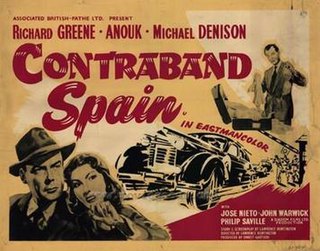
Contraband Spain is a 1955 crime film written and directed by Lawrence Huntington and starring Richard Greene, Anouk Aimée and Michael Denison. Its Spanish title is Contrabando.
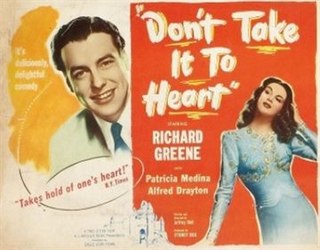
Don't Take It to Heart is a 1944 British comedy film directed by Jeffrey Dell and starring Richard Greene, Alfred Drayton, Patricia Medina, Moore Marriott and Richard Bird.
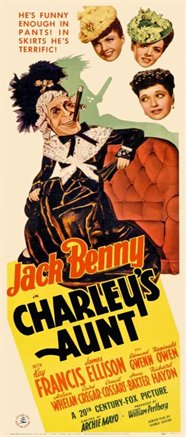
Charley's Aunt is a 1941 American historical comedy film directed by Archie Mayo. It stars Jack Benny and Kay Francis. It was the fourth American filmed version of the 1892 stage farce of the same name by Brandon Thomas. It remained one of Benny's personal favourites among his own films.

Secrets of Monte Carlo is a 1951 American crime film directed by George Blair and starring Warren Douglas, Lois Hall and June Vincent.
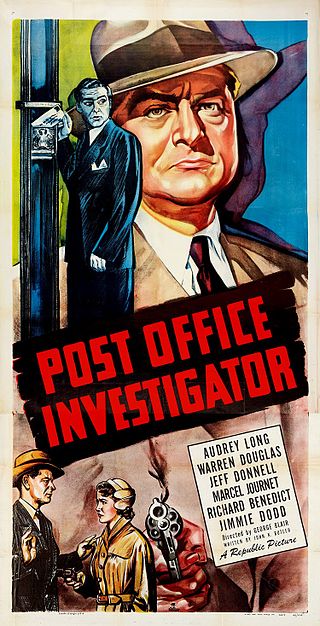
Post Office Investigator is a 1949 black and white American crime film about the theft of postage stamps, directed by George Blair, and starring Audrey Long, Warren Douglas and Jeff Donnell. Allmovie called it a "diligent Republic programmer."
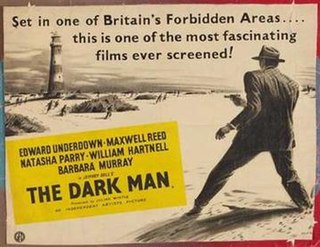
The Dark Man is a 1951 British black and white, film-noir, thriller, crime, drama, film, from Rank Studios, written and directed by Jeffrey Dell, and starring Edward Underdown, Maxwell Reed and Natasha Parry.

Dangerous Passion is a 1990 American made-for-television crime thriller film starring Carl Weathers, Billy Dee Williams and Lonette McKee, and directed by Michael Miller. The film, produced by Carolco Pictures, premiered on the ABC network on March 25, 1990.



















